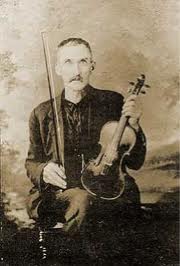Annotation:Ducks on the Millpond: Difference between revisions
No edit summary |
No edit summary |
||
| Line 2: | Line 2: | ||
---- | ---- | ||
<p><font face="garamond, serif" size="4"> | <p><font face="garamond, serif" size="4"> | ||
'''DUCKS ON THE MILLPOND'''. AKA and see "[[Deaf Woman's Courtship]]." Old-Time, Breakdown. USA; southwest Va. (Grayson County), Mt. Airy, N.C. D Major. ADae tuning (fiddle). AB (Silberberg): AABB (Brody, Krassen, Phillips/Lundy, Spadaro): AA'BB' (Phillips/Sutphin, Hollow Rock String Band). Most modern versions are derived from the playing of Grayson County, Virginia, fiddler Emmett Lundy [http://www.oldtimemusic.com/FHOFLundy.html] (1864-1953). Lundy, who learned his repertoire in the 19th century, cited his most influential source as a local fiddler named Greenbury (Green) Leonard, who was an elderly man when Lundy learned tunes from him in the 1880's and 1890's. Alan Lomax collected the tune from Galax, Va., musician Fields Ward in 1937, and thought the tune related to "Old Dan Tucker." Later, in 1941, Lomax recorded Lundy playing "Ducks on the Millpond" for the Library of Congress. "Ducks on the Millpond" is sometimes confused with the similarly-titled Appalachian tune "[[Ducks on the Pond]]." Lyrics are occasionally sung to the tune (although Lundy did not vocalize): | '''DUCKS ON THE MILLPOND'''. AKA and see "[[Deaf Woman's Courtship]]." Old-Time, Breakdown. USA; southwest Va. (Grayson County), Mt. Airy, N.C. D Major. ADae tuning (fiddle). AB (Silberberg): AABB (Brody, Krassen, Phillips/Lundy, Spadaro): AA'BB' (Phillips/Sutphin, Hollow Rock String Band). Most modern versions are derived from the playing of Grayson County, Virginia, fiddler Emmett Lundy [http://www.oldtimemusic.com/FHOFLundy.html] (1864-1953). Lundy, who learned his repertoire in the 19th century, cited his most influential source as a local fiddler named Greenbury (Green) Leonard, who was an elderly man when Lundy learned tunes from him in the 1880's and 1890's. Alan Lomax collected the tune from Galax, Va., musician Fields Ward in 1937, and thought the tune related to "Old Dan Tucker." Later, in 1941, Lomax recorded Lundy playing "Ducks on the Millpond" for the Library of Congress. "Ducks on the Millpond" is sometimes confused with the similarly-titled Appalachian tune "[[Ducks on the Pond]]." | ||
[[File:lundy.jpg|200px|thumb|left|Emmett Lundy]] | |||
Lyrics are occasionally sung to the tune (although Lundy did not vocalize): | |||
<blockquote> | <blockquote> | ||
''Ducks in the millpond, Geese in the ocean;''<br> | ''Ducks in the millpond, Geese in the ocean;''<br> | ||
Revision as of 21:54, 31 October 2012
Back to Ducks on the Millpond
DUCKS ON THE MILLPOND. AKA and see "Deaf Woman's Courtship." Old-Time, Breakdown. USA; southwest Va. (Grayson County), Mt. Airy, N.C. D Major. ADae tuning (fiddle). AB (Silberberg): AABB (Brody, Krassen, Phillips/Lundy, Spadaro): AA'BB' (Phillips/Sutphin, Hollow Rock String Band). Most modern versions are derived from the playing of Grayson County, Virginia, fiddler Emmett Lundy [1] (1864-1953). Lundy, who learned his repertoire in the 19th century, cited his most influential source as a local fiddler named Greenbury (Green) Leonard, who was an elderly man when Lundy learned tunes from him in the 1880's and 1890's. Alan Lomax collected the tune from Galax, Va., musician Fields Ward in 1937, and thought the tune related to "Old Dan Tucker." Later, in 1941, Lomax recorded Lundy playing "Ducks on the Millpond" for the Library of Congress. "Ducks on the Millpond" is sometimes confused with the similarly-titled Appalachian tune "Ducks on the Pond."

Lyrics are occasionally sung to the tune (although Lundy did not vocalize):
Ducks in the millpond, Geese in the ocean;
Hug them pretty girls, If I take a notion.
Cho:
Lord, Lord, gonna get on a rinktum,
Lord, Lord, gonna get on a rinktum.
Ducks in the millpond, Geese in the clover,
Jumped in the bed, And the bed turned over.
Ducks in the millpond, Geese in the clover,
Fell in the millpond, Wet all over. (Lomax)
Rain come and wet me, sun come and dry me,
Step back pretty girl, don't you come nigh me. (Tommy Jarrell)
Sources for notated versions: Fuzzy Mountain String Band (N.C.) [Brody]; Emmett Lundy (Galax, Va.) [Fiddler Magazine, Krassen, Milliner & Koken, Phillips]; Kirk Sutphin [Phillips].
Printed sources: Brody (Fiddler's Fakebook), 1983; p. 93. Fiddler Magazine, Summer 2008, vol. 15, No. 2; p. 35. Krassen (Appalachian Fiddle), 1983; pp. 31-32. Milliner & Koken (Milliner-Koken Collection of American Fiddle Tunes), 2011; p. 176. Phillips (Traditional American Fiddle Tunes), vol. 1, 1994; p. 76 (two versions). Silberberg (Tunes I Learned at Tractor Tavern), 2002; p. 38. Spadaro (10 Cents a Dance), 1980; p. 19.
Recorded sources: Copper Creek CCCD 0193, Bill and Libby Hicks - "South of Nowhere." County 748, Tommy Jarrell- "Come and Go with Me." Rounder 0035, Fuzzy Mountain String Band- "Summer Oaks and Porch" (1973. Learned from Tommy Jarrell, Mt. Airy, N.C.).
See also listing at:
Jane Keefer's Folk Music Index [2].
Hear Emmett Lundy play the tune at Slippery Hill [3]
Back to Ducks on the Millpond
